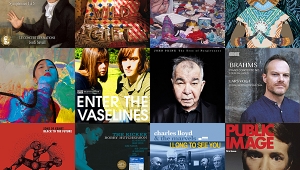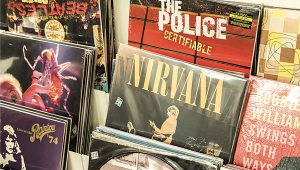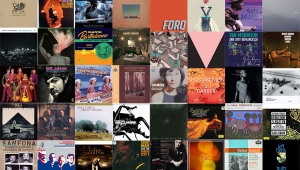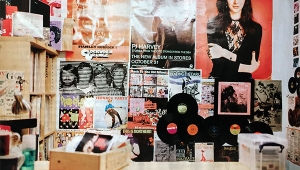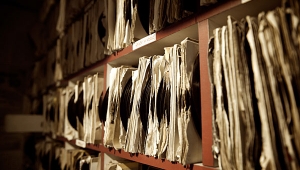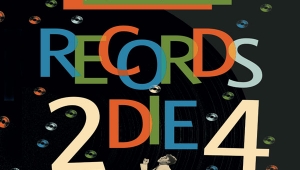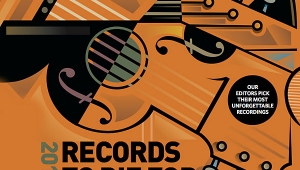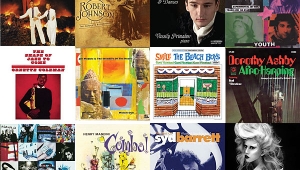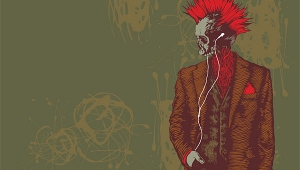| Columns Retired Columns & Blogs |
1993 Records To Die For Page 9
Markus Sauer
CANNONBALL ADDERLEY: Something Else
Miles Davis, trumpet; Cannonball Adderley, alto sax; Hank Jones, piano; Sam Jones, bass; Art Blakey, drums
Blue Note BST 81.595 (LP). Rudy van Gelder, eng. AAA. TT: 38:38
This is one of the classic Blue Note albums. What do you say about an album that has been universally praised since its first release in 1958? To even hint at criticism of the playing would be childish; to nit-pick about the sound of this really nice Rudy van Gelder recording would be futile---it's obviously good enough to let the music shine through. And shine it does. For me, this is not only a record to die for, but also a desert island disc, an album I'll never tire of hearing.
NINA SIMONE: My Baby Just Cares for Me
Nina Simone, vocals, piano
Charly Records CR 30217 (LP). AAA.
Most of the 14 songs of this 1982 Charly compilation from Bethlehem tapes feature just Miss Simone and her piano; on some, a tasteful bass and drums accompany her. What makes this album, and much of Simone's music, so compelling for me is the constant struggle between restraint and intensity. The tempo is always slow, the pronunciation always careful, the mood unhurried---but within these constraints, Simone shows an impressive ability to get emotions across to the listener. Highlights for me are the tender sadness on "Don't Smoke in Bed" and the not-quite-certain love on "I Loves You Porgy"---a wonderful album to snuggle up with with someone late at night.
Richard Schneider
DEBUSSY: La Mer
IBERT: Ports of Call
Charles Munch, Boston Symphony
RCA LSC-2111 (LP). Lewis Layton, eng.; Richard Mohr, prod. AAA. TT: 32:58
MUSSORGSKY/RAVEL: Pictures at an Exhibition
Fritz Reiner, Chicago Symphony
RCA LSC-2201 (LP). Lewis Layton, eng.; Richard Mohr, prod. AAA. TT: 38:04
Each of these vinyl beauties continues to elude the best that CD can offer. Although the Munch/BSO La Mer has been available on CD for several years, Ibert's Ports of Call has yet to appear in the current format. In virtually every respect, this is one of the most successful of all of RCA's "shaded dog" Living Stereos. One is never aware of limitations of either dynamic or frequency range. Recorded in 1956, three-channel 15ips, it's rather close-up miking, but never crowded. Symphony Hall timbral and spatial characteristics are evident.
Don Scott
TRINITY COLLEGE CHOIR, CAMBRIDGE: Carols from Trinity
Traditional works by Bach, Berlioz, Brahms, Hadley, Handel, Mendelssohn, Marlow
The Choir of Trinity College, Cambridge, Richard Marlow, dir.; Graham Jackson, Richard Pearce, Richard Marlow, organists
Conifer CDCF 501 (CD only). John Kehoe, exec. prod.; Anthony R. Howell, eng. DDD. TT: 70:35
Selections follow the Nativity from Advent and the Annunciation to the Birth, the visits of the Wise Men, the Slaughter of the Innocents, and finally the New Year. The Advent Responsory by director Richard Marlow is based on Bach's "Wachet auf" harmonizations and has quickly become a year-round personal favorite for goosebump evaluation of audio equipment. In this selection, the male soprano soloist goes higher than any voice I've ever heard, with rich overtones that soar even higher. At the same time, the air movement of the natural resonance (near 30Hz) of the chapel can be heard best on this cut, and the placement of the remaining choir, spaced back mainly on the right, combine to be a good test of response limits and proper soundstaging of a total system. Other selections are less spectacular and applicable for seasonal listening.
DUKE ELLINGTON ORCHESTRA: Digital Duke
Duke Ellington Orchestra, Mercer Ellington, conductor; Branford Marsalis, Eddie Daniels, Clark Terry, Louie Bellson, Norris Turney, Britt Woodman, Roland Hanna, special guests
GRP GRD 9548 (CD only). Ed Hack, eng.; Mercer Ellington, Michael Abene, prods. DDD. TT: 68:30
"Mood Indigo" was a hit when first recorded October 17, 1930, but this 1987 recording is, in my opinion, the epitome of the right balance between jazz individuality, buffed with just enough polish, to warrant saying, "Man, this is great listening!"
Denis Stevens
HAYDN: Three Violin Concertos
MOZART: Rondo in C
Christian Tetzlaff, violin; Northern Sinfonia, Heinrich Schiff
Virgin 91489-2 (CD only). Mike Clements, Sean Lewis, engs.; Tony Harrison, prod. DDD. TT: 67:27
These Haydn concertos sound remarkably fine, with perfect balance and superb acoustics. Tetzlaff is inspired, as are orchestra and conductor. Less well known than Mozart's concertos, in performances such as this they shine with a new light. This is joyous concerted music, beautifully recorded.
MONTEVERDI: Salve Regina
Gerard Lesne, Josep Benet, Josep Cabre, Brigitte Lesne, Il Seminario Tragicomedia
Virgin 91145-2 (CD only). Fran;kcois Eckert, eng.; Michel Bernard, prod. DDD. TT: 64:43
Magnificent singing by one or several voices accompanied by a small group of early instruments. The recording is crystal-clear, with perfect balance between the voices and the instruments individually. A warm, sympathetic acoustic.
CANNONBALL ADDERLEY: Something Else
Miles Davis, trumpet; Cannonball Adderley, alto sax; Hank Jones, piano; Sam Jones, bass; Art Blakey, drums
Blue Note BST 81.595 (LP). Rudy van Gelder, eng. AAA. TT: 38:38
This is one of the classic Blue Note albums. What do you say about an album that has been universally praised since its first release in 1958? To even hint at criticism of the playing would be childish; to nit-pick about the sound of this really nice Rudy van Gelder recording would be futile---it's obviously good enough to let the music shine through. And shine it does. For me, this is not only a record to die for, but also a desert island disc, an album I'll never tire of hearing.
NINA SIMONE: My Baby Just Cares for Me
Nina Simone, vocals, piano
Charly Records CR 30217 (LP). AAA.
Most of the 14 songs of this 1982 Charly compilation from Bethlehem tapes feature just Miss Simone and her piano; on some, a tasteful bass and drums accompany her. What makes this album, and much of Simone's music, so compelling for me is the constant struggle between restraint and intensity. The tempo is always slow, the pronunciation always careful, the mood unhurried---but within these constraints, Simone shows an impressive ability to get emotions across to the listener. Highlights for me are the tender sadness on "Don't Smoke in Bed" and the not-quite-certain love on "I Loves You Porgy"---a wonderful album to snuggle up with with someone late at night.
The piano is a little on the clangy side, and the acoustic bass could sound a little bigger, but the voice! The microdynamics are extremely convincingly captured (I'll bet it was a tube mike). One of my fave test discs for voice reproduction.
Richard Schneider
DEBUSSY: La Mer
IBERT: Ports of Call
Charles Munch, Boston Symphony
RCA LSC-2111 (LP). Lewis Layton, eng.; Richard Mohr, prod. AAA. TT: 32:58
MUSSORGSKY/RAVEL: Pictures at an Exhibition
Fritz Reiner, Chicago Symphony
RCA LSC-2201 (LP). Lewis Layton, eng.; Richard Mohr, prod. AAA. TT: 38:04
Each of these vinyl beauties continues to elude the best that CD can offer. Although the Munch/BSO La Mer has been available on CD for several years, Ibert's Ports of Call has yet to appear in the current format. In virtually every respect, this is one of the most successful of all of RCA's "shaded dog" Living Stereos. One is never aware of limitations of either dynamic or frequency range. Recorded in 1956, three-channel 15ips, it's rather close-up miking, but never crowded. Symphony Hall timbral and spatial characteristics are evident.
The vinyl of Pictures by Reiner/CSO is among the very earliest stereo LPs I ever collected. Recorded in 1957 and issued in the summer of 1958, this record has become a collector's item of some substance. The CD version seems to lack the early vinyl pressing's full breath of analog life, just as the digiphobes have said all along. What a challenge this recording would be for remastering in RCA's new Living Stereo CD series. Unfortunately, rumor has it that the original session master from this recording is missing. Maybe the master will turn up as others recently have, but even if a truly splendid CD can be made from it, or of the Munch Debussy/Ibert, few collectors who own the originals will want to part with them.
Don Scott
TRINITY COLLEGE CHOIR, CAMBRIDGE: Carols from Trinity
Traditional works by Bach, Berlioz, Brahms, Hadley, Handel, Mendelssohn, Marlow
The Choir of Trinity College, Cambridge, Richard Marlow, dir.; Graham Jackson, Richard Pearce, Richard Marlow, organists
Conifer CDCF 501 (CD only). John Kehoe, exec. prod.; Anthony R. Howell, eng. DDD. TT: 70:35
Selections follow the Nativity from Advent and the Annunciation to the Birth, the visits of the Wise Men, the Slaughter of the Innocents, and finally the New Year. The Advent Responsory by director Richard Marlow is based on Bach's "Wachet auf" harmonizations and has quickly become a year-round personal favorite for goosebump evaluation of audio equipment. In this selection, the male soprano soloist goes higher than any voice I've ever heard, with rich overtones that soar even higher. At the same time, the air movement of the natural resonance (near 30Hz) of the chapel can be heard best on this cut, and the placement of the remaining choir, spaced back mainly on the right, combine to be a good test of response limits and proper soundstaging of a total system. Other selections are less spectacular and applicable for seasonal listening.
DUKE ELLINGTON ORCHESTRA: Digital Duke
Duke Ellington Orchestra, Mercer Ellington, conductor; Branford Marsalis, Eddie Daniels, Clark Terry, Louie Bellson, Norris Turney, Britt Woodman, Roland Hanna, special guests
GRP GRD 9548 (CD only). Ed Hack, eng.; Mercer Ellington, Michael Abene, prods. DDD. TT: 68:30
"Mood Indigo" was a hit when first recorded October 17, 1930, but this 1987 recording is, in my opinion, the epitome of the right balance between jazz individuality, buffed with just enough polish, to warrant saying, "Man, this is great listening!"
Roland Hanna's Monk-like piano sets the mood; the clarinet of Eddie Daniels, played in a low register, adds smoothness to the cut. Hanna repeats the piano intro near the end of the selection, and there are startling staccato chords that were late Ellington trademarks.
The sound is well-balanced, natural, and full of detail, illustrating the magnificence of the Neve 32-channel console used in the nostalgic mixdown. "Mood Indigo" does appear to be the smoothest cut from electronic and performance viewpoints, although "22 Cent Stamp" and "Do Nothin' Till You Hear From Me" are close seconds. Essential for the non-jazz enthusiast. It just might change your mind.
Denis Stevens
HAYDN: Three Violin Concertos
MOZART: Rondo in C
Christian Tetzlaff, violin; Northern Sinfonia, Heinrich Schiff
Virgin 91489-2 (CD only). Mike Clements, Sean Lewis, engs.; Tony Harrison, prod. DDD. TT: 67:27
These Haydn concertos sound remarkably fine, with perfect balance and superb acoustics. Tetzlaff is inspired, as are orchestra and conductor. Less well known than Mozart's concertos, in performances such as this they shine with a new light. This is joyous concerted music, beautifully recorded.
MONTEVERDI: Salve Regina
Gerard Lesne, Josep Benet, Josep Cabre, Brigitte Lesne, Il Seminario Tragicomedia
Virgin 91145-2 (CD only). Fran;kcois Eckert, eng.; Michel Bernard, prod. DDD. TT: 64:43
Magnificent singing by one or several voices accompanied by a small group of early instruments. The recording is crystal-clear, with perfect balance between the voices and the instruments individually. A warm, sympathetic acoustic.
Of the 20 items, all but two are vocal, the exceptions being two motets from the 1610 Vespers, here arranged for instruments alone. The remainder range widely over Monteverdi's published and unpublished works, throwing unusually clear light on his church music and the one non-liturgical moralistic piece, "Spuntava il dìi."
This is one performance that I would place on a pinnacle, despite the occasonially hurried declamation; others of exceptional interest are "Salve Regina," "Exulta filia Sion," and "Fuge anima mea," a charming duet written for the feast of St. John Baptist. (XV-5) ![]()
- Log in or register to post comments

